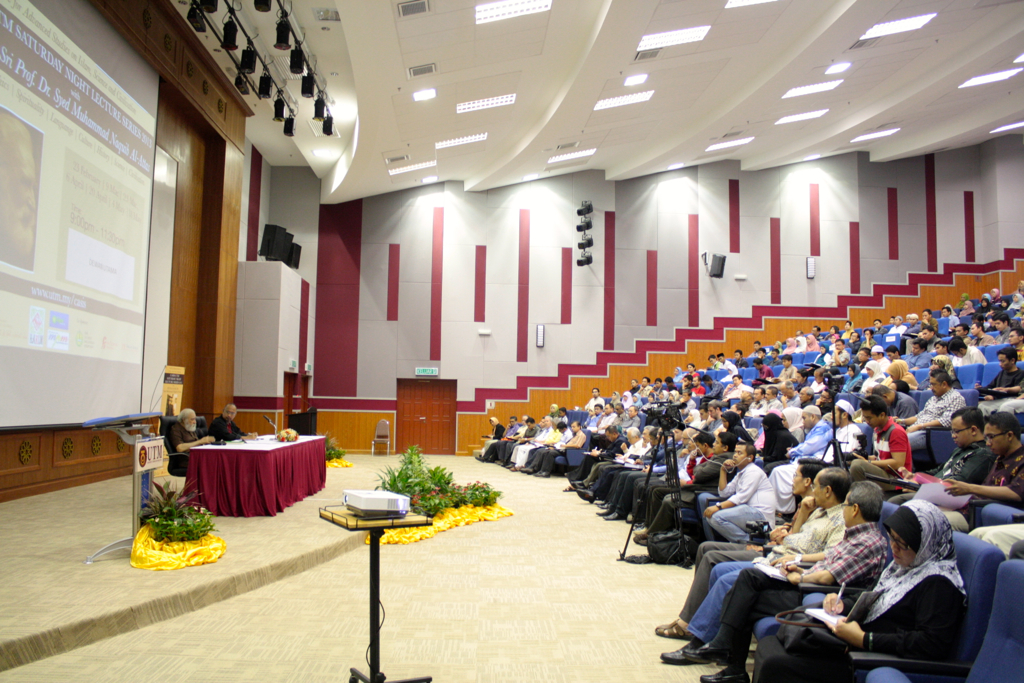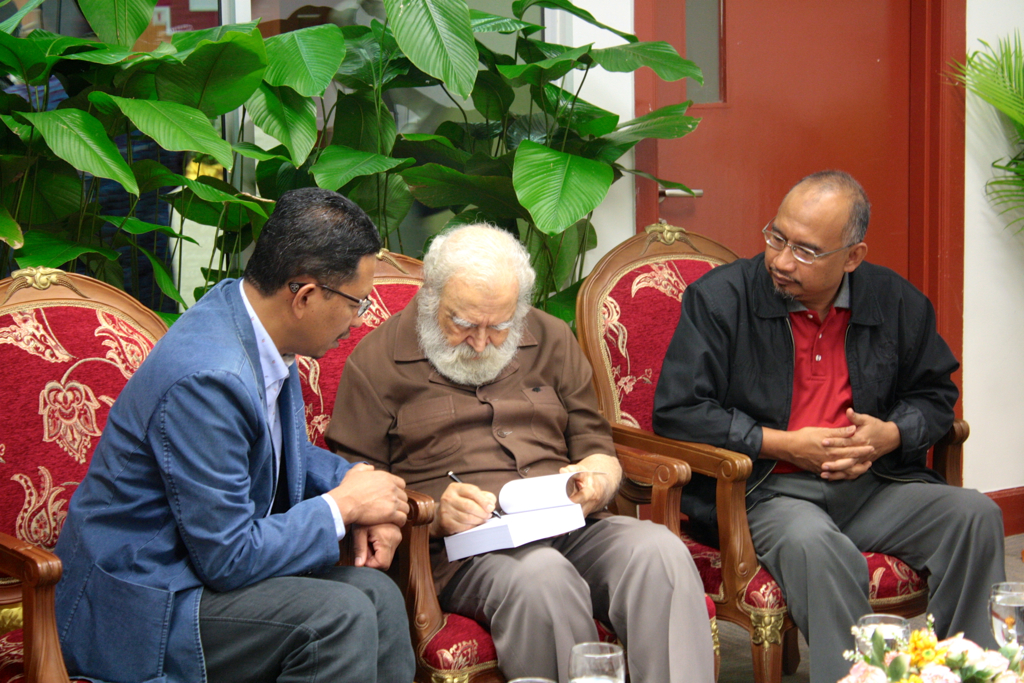SAVE THE DATE! 4th Lecture Series is due this weekend on the 6th of April 2013 to register click here
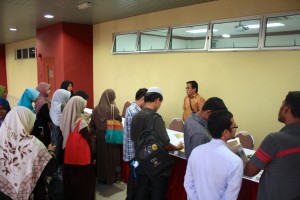 It was a momentous evening. For the first time, the lecture was held at the huge Dewan Utama lecture hall in the newly built edifice, the landmark of the campus. The decision to move from the old Dewan Jumuah proved to be wise as one notices the scarcity of empty seats even in a hall that was supposedly able to host over five hundred people. Adjacent to the lecture hall was the waiting room for important guests and VIPs to have a warm up discussion session with the Vice Chancellor as we wait for the Professor’s arrival.
It was a momentous evening. For the first time, the lecture was held at the huge Dewan Utama lecture hall in the newly built edifice, the landmark of the campus. The decision to move from the old Dewan Jumuah proved to be wise as one notices the scarcity of empty seats even in a hall that was supposedly able to host over five hundred people. Adjacent to the lecture hall was the waiting room for important guests and VIPs to have a warm up discussion session with the Vice Chancellor as we wait for the Professor’s arrival.
The house turned solemn followed a brief welcoming note by Professor Wan Mohd Nor, and now the lecture begins. The Professor began by pointing out that many Western thinkers have been deliberating, commenting and giving expositions on the meaning of “Justice”. At the same time, the Muslims, who pride themselves with the great achievements of their past in scholarly expositions on various subjects such as law, the nature of God, nature of knowledge, the world and so on, a civilisational force to be reckon with, has not done anything to comment on this notion of “Justice”, not in a manner that is systematic, that its unfolding could be regarded as a science. On the other hand, there are also Muslims, the modernists, the Professor called them, who carelessly yet deliberately chose to ignore the tremendous works that has been done in the past and simply go back directly to the Qur’ān, Sunnah and the Salaf. Perhaps they have good intention, the Professor said, but by doing this we lost a great deal of what our past thinkers have laid down, clarified, and systematized for us, thus leaving us perplexed and confused. Due to this confusion that now arises, it is necessary for us to talk about The Worldview of Islam.
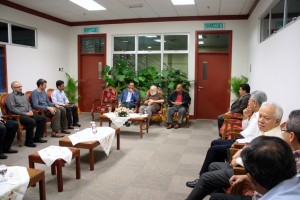
The worldview of Islam is not “nazrat al-islām li’l-kawn”, the Professor said, but it is “ru’yat al-islām li’l-wujūd”. It is not merely a physical act of vision towards the world of sense and sensibles, but it is a metaphysical survey or vision, through the eye of the intellect, of the whole reality. An immediate corollary to this is that its concerns include the Ākhirah. In fact the Ākhirah is the major concern as everything in this world is intimately related ultimately to it. Thus, knowing God becomes an indispensable necessity. But the mind would soon be asking questions such as, “How do we achieve that?”, “What are the valid means?”, “What it the nature of this knowledge?” and the like. Now we realize that we could not put our minds to a settled state unless we understand also the nature of God, the Qur’ān, the Prophet, the nature of man, the nature of this world and so on. A lot of these has already been preserved and passed on to us in the writings of scholars of the past as well as in their selves. While they are all derived from the primary sources of the religion, namely the Qur’ān and the Sunnah, it is an indication of arrogance if we presume we could tap these sources directly and truthfully while ignoring the great contributions of generations of scholars of our Community that has done a great deal of elaboration, clarification and systematization, a feat that is unparalleled and deserving of our due recognition, acknowledgement and gratitude.
The Professor then pointed out that we cannot develop worldview. We can only develop ourselves to understand this worldview. The worldview resides in the minds of people who understand. It is not merely some kind of mathematical formula, nor it is some conceptual scheme akin to strategic thinking skills that business people develop to attain their goals. The worldview did not develop, nor did it undergo change. It has always been as it is as it has been preserved in many ways, including in the formal rituals,`ibādāt of the Muslims. He also commented on the existence of so many religions, cultures, and civilisations in this world, that perhaps may tempt people to erroneously conclude that truth cannot be attained, or that truth is relative, or even there is no such thing as truth. In addressing this, the Professor commented on the meaning of haqq, that it is not just truth as in the property of propositional statements but it is also real. He also reminded us, that even the Prophet s.a.w himself in his prayers asked for knowledge that are useful. In other words, there can be knowledge that are not useful. Perhaps certain things are useful in certain places and times but not in other places and times. This we have to discern. We must be clear of our priorities. Just to point out an example of a treasure that we could benefit from past scholarship, the Professor mentioned the classification of knowledge into farḍ `ayn and farḍ kifāyah[1]. This simply shows us that we must do justice even towards knowledge, and we have always been trying to do that since man has already being born with the inclination towards justice.
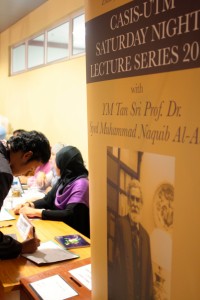
To demonstrate further the preservation of the worldview of Islām, the Professor pointed out that compilation of dictionaries has begun very early in our history, in fact right from the beginning. The first who did this was Ibn `Abbās r.a. himself. The purpose was not merely an intellectual exercise, but was deliberately done in order to preserve the meanings of terms and to warn Muslims that they should not simply use words as they like. This scholarly and meticulous tradition of compiling great dictionaries was carried out further by later scholars like Ibn Manzūr and Al-Zabīdī in their works Lisān al-`Arab and Tāj al-`Arūs respectively. Furthermore, the Qur’ān itself preserves the meaning of terms and the language as it is a living Arabic language. It has been recited, pondered and acted upon by generations of upright people one after the other. Even the practice of ṣalāt is a preservation of the worldview. Everything in the ṣalāt is as if God is praising Himself through us. Isn’t the Prophet s.a.w. himself was the one who said in one of his prayers, “…anta kamā athnayta `alā nafsik…”, …You are as You have praised Yourself…” ?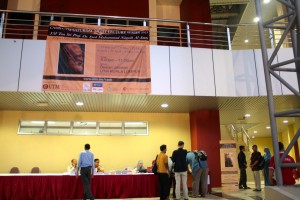
The Professor reminded us further that to say that we cannot know anything about God is simply not true, for God Himself tells us about Himself in the Qur’ān, “shahida Allahu annahu lā ilāha illā huwa…”[2]. Here we are told that He is One. He is One with oneness that is unimaginable, not merely the `numerical one’. The Professor then ridiculed the the atheists by arguing that even atheists had to admit that there is God for them to deny. Therefore even in the mind it is inconceivable that there is no God and that he is not One. Of course knowing God[3] is not so simple and may involve a life long endeavor, but this does not mean it could not be explained according the different levels of understanding. An example given by the Professor is to suppose that our children ask, “where is God?”, we should rightly answer, “God is everywhere.”, but this does not mean everything that could and should be understood about God is achieved. The real and deeper understanding would come gradually as one matures. Having said this does not mean that the worldview develops. It is the person who develops in order to understand the worldview. The professor kept on stressing this point time and again throughout the lecture.
The Professor went on further by commenting on the nature of the Qur’ān, it is His words, where He speaks about many things including Himself and His creation. The Qur’ān also did not undergo development, further more in itself a declaration was made that it is “ghayra dhī`iwajin”[4], “without crookedness” for it to require correction and development. This is proof that knowledge and certainty can be attained. A corollary to that would be that the world is not just an illusion, it is real. That names have realities. That the reality of words are their meanings. At this point the Professor made a strong statement commenting about some people who argue, “if you call a wood stone, it is still a wood!”, that this is a confused argument and wrong thinking! “Even Allah s.w.t Himself has got Names”, the Professor stressed. He went further by saying that the ultimate nature of realities are difference; that things have realities, they exist for a purpose, they have proper measure; that the soul does not die, it tastes death; that those who are deeply rooted in knowledge say “this is from God…”[5]; that the Qur’ān talks about the universe, that is it always in the state of fanā’, extinction, disappearing. “kullu man `alayha fān. Wa yabqā wajhu rabbika dhu’l-Jalāli wa’l-ikrām”[6], “kullu shay’in hālikun illa wajhah[7]”, and the prayer of the Prophet s.a.w., “Allāhumma arinā’l-ashyā’a kamā hiya”. From these the atomists[8] like al-Ash`arī, al-Mātūrīdī, al-Bāqillānī form their positions, that there is “al-juz’ alladhī lā yatajazzā’”, that part which cannot be further divided, the essence of things; that they are all in the state of flux.
All these are very much unlike Christianity, a religion that develops in history. We have been encountering Christianity for ages and definitive answers to them has been done profoundly in our history by our great scholars of the past. Is it not strange that now suddenly we are called to do dialogue on these matters, and then we are required not to affirm our belief and denounce theirs as false, that if we do not do this we are intolerant, that religious beliefs are relative to the believers, that actually these are matters of faith and people have rights to to their own faith. Now we, the Muslims are the ones who has to justify our positions, and we even see some Muslim scholars (supposedly) who are in support of these. Strange world indeed.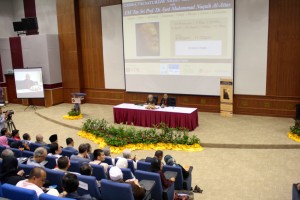
So the lecture ends. The audience went to enjoy their refreshments after a heavy banquet of the mind and soul, quenched and nourished.
summarized by
Muhammad Ikhwan bin Azlan , a PhD Student at CASIS
For the pdf version, click here
For registration, click here
[1] Imām al-Ghazālī was the one who coined the term, but the idea can be traced back to Imām al-Shāfi`ī in his al-Risālah.
[2] Sūrah Āli `Imrān, 18.
[3] Read: Ma`rifah.
[4] Al-Zumar, 28.
[5] Āli `Imrān, 7.
[6] Al-Raḥmān, 26-27.
[7] Al-Qaṣaṣ, 88.
[8] The Imāms in the formulation of knowledge of `Aqīdah.

